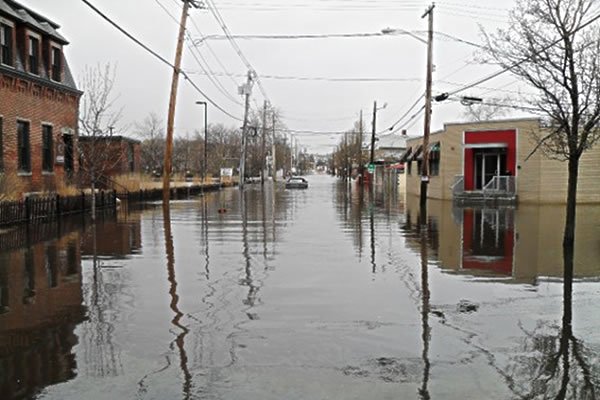Sink or Swim: How a diverse Providence community is tackling the unequal racial impacts of climate change in their neighborhoods
August 2020
Typically, when an environmental problem arises – a hurricane or forest fire or tornado – communities are able to work with their respective state and federal governments to prepare and implement a response. Government agencies are designed to react and address these types of imminent crises. They assess the threat level, find funds, respond, rebuild, and then, ideally, review and adapt in preparation for future events. They are constantly learning, planning, and adapting; but climate change offers a new set of challenges whose solutions do not necessarily respond well to reactionary policies. There is no singular, imminent climate event that we will be required to address because of climate change; rather, our environment itself – that is, its average baseline – is slowly, methodically, shifting toward a different, less predictable normal.
As governments throughout the world continue to work on a unified response, the slow march toward this new baseline climate condition is revealing a growing equity problem throughout our communities.
The projected effects of climate change have the potential to be ubiquitous for each and every community, albeit in different ways. Depending on a community's location and its surrounding environment, future climate threats such as an increase in the frequency and intensity of forest fires, an increase in the severity and frequency of drought, more intense storms, more intense and frequent heat waves, a rise in average global temperature, or a rise in average sea-level and tides (to name a few) – can all vary in prevalence for a given community; but that community's ability to plan, adapt, and respond to these challenges is limited by its available revenues. In the absence of state or federal assistance, this means that more affluent, and typically whiter, communities will have more resources to adapt and respond to environmental threats than will lower-income communities, which are also more typically communities of color.
To help correct for these disparities, EPA's Office of Environmental Justice (OEJ) is taking steps to ensure environmental justice (EJ) is considered in decision-making, and to identify and partner with EJ communities as they respond to their unique environmental challenges.

According to OEJ, environmental justice is "the fair treatment and meaningful involvement of all people regardless of race, color, national origin, or income, with respect to the development, implementation, and enforcement of environmental laws, regulations, and policies." As such, the OEJ highlights that its goals for every environmental justice community are to ensure "equal access to the decision-making process" in building a healthy environment for their community and ensuring "the same degree of protection from health and environmental hazards." OEJ awards multiple EJ grants annually to programs and communities throughout the country. One local recipient is the Woonasquatucket River Watershed Council (WRWC), which recently received an EJ Grant for their proposed work to "create a model for engagement, capacity and leadership promotion in vulnerable, underserved neighborhoods in Providence, RI, for the purposes of planning and advocacy around stormwater, flooding, resiliency and sea level rise by those who will be most impacted." The project will be divided into four separate stages: 1) trust-building with local constituents by hosting the "Undoing Racism" workshop conducted by The People's Institute for Survival and Beyond; 2) offering mentorship opportunities between local leaders and a youth cohort at Providence's Metropolitan Regional Career and Technical Center school with a focus on community-based climate resiliency and problem solving; 3) building relationships between Providence students, their Mayor, and the Director of Sustainability; and 4) supporting collaborative youth-led projects to implement climate resiliency solutions throughout the Olneyville community in Providence.
"The Woonasquatucket River Watershed Council is thrilled to be a 2020 recipient of the EPA Environmental Justice Collaborative Problem Solving grant for our project, 'New Voices at the Water Table,'" said Alicia Lehrer, executive director of the WRWC. "New Voices will create a model for engagement, capacity and leadership building at the nexus of racism and climate change in Olneyville, a target neighborhood for these issues in Providence, RI. Olneyville has been greatly impacted by flooding events, a river that is unsafe for contact, poor air quality and intense summer heat. At Woonasquatucket River Watershed Council, we believe residents deserve to have a voice in planning for their own neighborhood resiliency, and that in fact their collaboration and participation are critical to making lasting changes. New Voices will bring together local youth in WRWC's Environmental Leaders program, new resident leaders and numerous Providence and statewide coalitions to build a strong foundation for local leadership on climate resilience and racial and environmental justice…With WRWC's many partners including funders such as SNEP, we can offer direct implementation support for collaborative problem-solving climate resiliency projects in Olneyville. The WRWC will share successes and lessons learned from this project to help build local environmental justice and resilience leadership in RI, in the region and nationally," she said.
Programs like these are an important first step in building partnerships between communities and their leadership in order to take collective ownership of the solutions needed for climate adaptation. Actions like this will be a critical piece of the climate puzzle; and EJ programs, like those of the WRWC, are working to ensure that all communities have an equal capacity to effectively respond with solutions.
